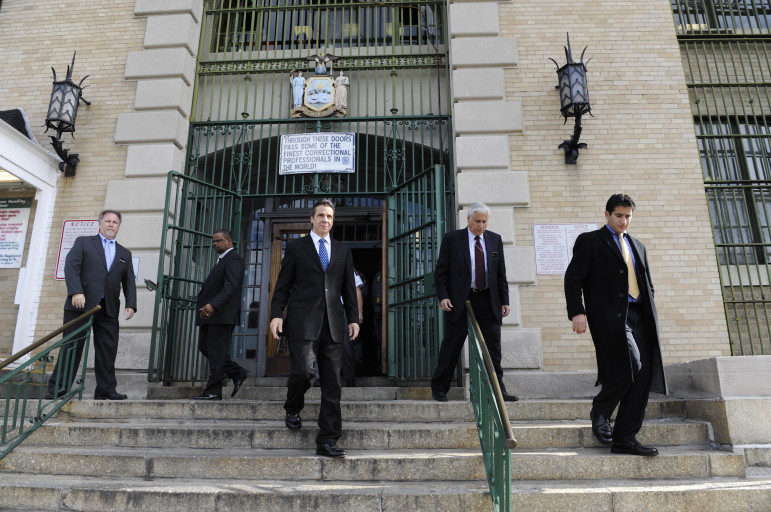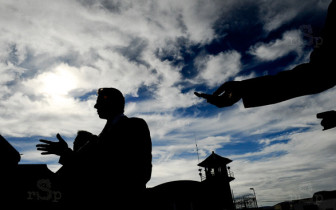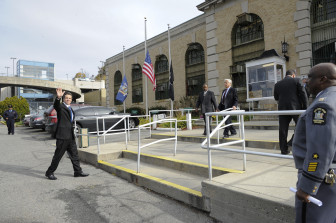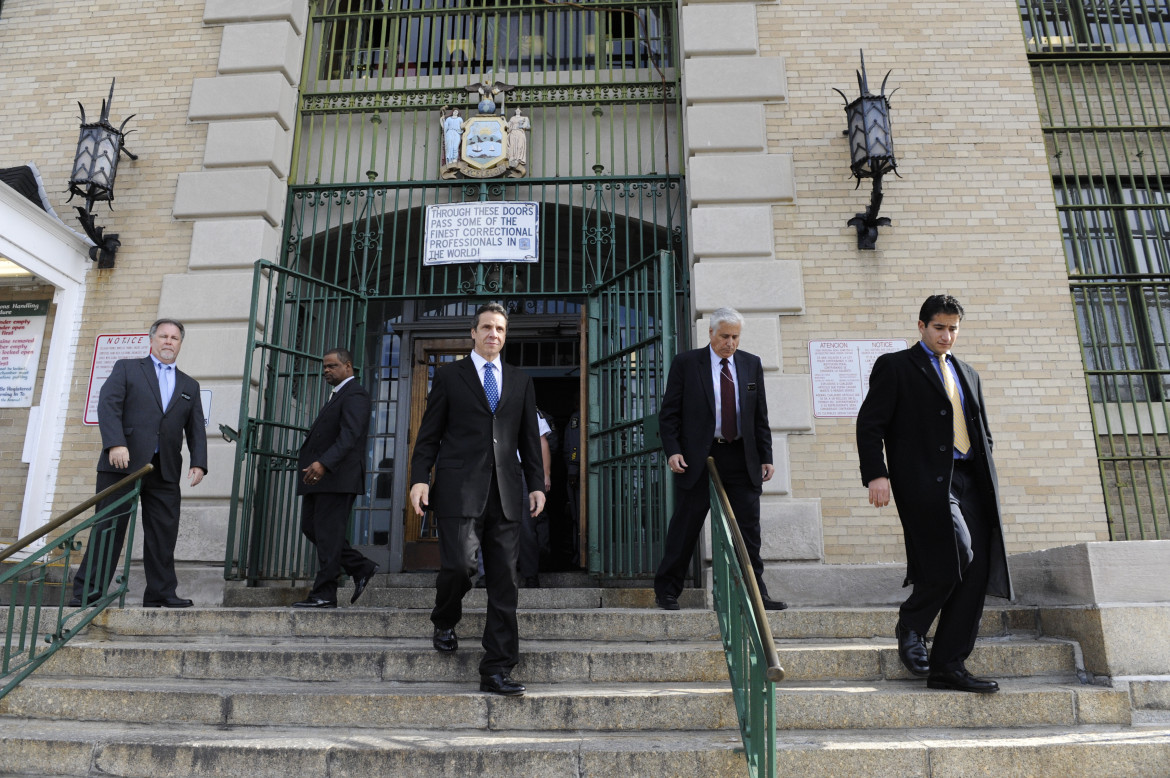
Robert Stolarik / JJIE
In April, Gov. Andrew Cuomo announced the members of the Commission on Youth, Public Safety and Justice, created in part to address raising the age of criminal responsibility. Gov. Andrew Cuomo visiting Sing Sing Correctional Facility.
NEW YORK — It was the tail-end of rush hour on a Thursday in March, and commuters were packed tightly onto a Brooklyn bus in Bedford-Stuyvesant. Passengers included a woman with her two small children, a Brooklyn father on the way from one job to another, and a couple of kids from rival gangs.
Not all of them got out alive.
Kahton Anderson was near the rear of the bus when he spotted rival gang members in the front. He pulled out a gun and fired into the crowded bus, missing his intended targets.
But Angel Rojas, a 39-year-old father of two, was shot in the back of the head. He died before he made it to the hospital.
 Lala Knight lives on the corner where the bus pulled to a stop. She said she saw people running off the bus, screaming, including the woman with her two young children.
Lala Knight lives on the corner where the bus pulled to a stop. She said she saw people running off the bus, screaming, including the woman with her two young children.
“It was sad, it was horrible,” Knight said.
Stories like these of gun violence are common in New York City, and around the nation, but this one was notable for a reason: the accused, Kahton Anderson, was a 14-year-old boy.
“I can’t believe it was a 14-year-old that did this,” Knight said. “I’m glad they got him.”
Enter the Governor
In April, Gov. Andrew Cuomo announced the members of the Commission on Youth, Public Safety and Justice, created in part to address raising the age of criminal responsibility. Today, New York and North Carolina are the only two states where young people 16 and older are automatically treated as adults.
“Our juvenile justice laws are outdated,” Cuomo said in his State of the State address this year. “It’s not right, it’s not fair — we must raise the age.”
The commission is tasked with serving up concrete recommendations about raising the age and juvenile justice reform by December. Alphonso David, the governor’s deputy secretary of civil rights, said the commission has to strike a balance.
“When we think about criminal justice reform we are addressing two platforms: reducing recidivism and ensuring public safety,” David said. “We are very focused on advancing both objectives, so recommendations would likely factor in both goals.”

Robert Stolarik / JJIE
“Our juvenile justice laws are outdated,” Cuomo said in his State of the State address this year. “It’s not right, it’s not fair — we must raise the age.”
Supporters of raise the age groups, like Campaign for Youth Justice, have touted studies that conclude young people’s brains aren’t fully developed until their mid-20s, and therefore are more open to rehabilitation. Research has also found that juveniles in adult prisons have much higher rates of suicide and physical and sexual abuse, and are more likely to be kept in solitary confinement compared to those in juvenile facilities.
“We’ve done a lot of polling and it tells us that people don’t like kids being in adult court,” said Jessica Sandoval, Campaign for Youth Justice’s vice president. “My instinct is to say that there’s an understanding among Americans that this isn’t how we should do business.”
In addition to safety concerns for youth held inside adult prisons, these young offenders can also face tough barriers to re-entering society, something advocates say keeps them cycling back through the system. Youth Represent, whose board chair will serve on the governor’s commission, regularly provides legal representation to young New Yorkers after they’ve been released.
Alison Wilkey, Youth Represent’s legal and policy director, said young people prosecuted as adults have to deal with more challenges once they are released. Public housing authorities, for example, can try to evict their families if they’ve been tried as an adult. And for young people applying to college, the difference between a juvenile offense and an adult criminal offense can decide their futures.
“Colleges ask about criminal records,” Wilkey said. Young people from other states who were arrested at 16 have only juvenile records, which are usually sealed, while 16-year-olds in New York have to state on their college applications if they have a criminal record. Because of this, “New York’s young people are at a huge disadvantage,” Wilkey said.
Not Everyone Agrees
But with high-profile cases like Kahton Anderson’s making the news, public support of Raise the Age legislation isn’t unanimous. Right now in New York, someone as young as 13 can be tried as an adult for serious offenses, which is why 14-year-old Anderson’s murder charge will be heard in adult criminal court, and potential legislation may not change that. In Connecticut, where a Raise the Age bill was passed in 2007, an important stipulation of the bill’s passage was that youths 14 and older who commit serious crimes can still be sent to adult court.
State Sen. Patrick Gallivan, the chair of the Crime Victims, Crime and Corrections committee, said the public’s perception of youthful offenders depends on the types of crimes they commit.
“Certainly murders, rapes, violent crimes are things that make people — the natural reaction from law-abiding citizens when they see something like that is they have very little tolerance and want them to be held accountable,” Gallivan said. “So the question is, do we treat those that commit violent crimes the same way as nonviolent offenders?”
Gallivan said he’s yet to decide his stance on raising the age, and he and the rest of committee are waiting to see the results of the governor’s commission before moving forward.

Robert Stolarik / JJIE
In April, Gov. Andrew Cuomo announced the members of the Commission on Youth, Public Safety and Justice, created in part to address raising the age of criminal responsibility. Gov. Andrew Cuomo visiting Sing Sing Correctional Facility.
Cuomo’s raise the age commission is part of a broader criminal justice reform in the state. Since 2008, New York state’s Office of Children and Family Services has closed 21 juvenile facilities, and since 2010, the number of juveniles placed in residential care has dropped 20 percent.
With the success of Connecticut’s Raise the Age legislation, which resulted in fewer youth in the system even with the addition of 16- and 17-year-olds, advocates have this in their favor as the committee enters into deliberations on what reforms they should propose. Alphonso David, Gov. Cuomo’s deputy Secretary of Civil Rights, said that fewer youth in the system creates the challenge of successfully reintegrating them back into society.
“Prison populations are lower and crime is down,” David said. “As we reduce the numbers of people incarcerated, we need to think creatively and strategically about how we engage folks in re-entry.”
State Sen. Gallivan said the commission is not likely to come out of talks with a fully formed piece of legislation; rather, it will make recommendations and see if a legislator will initiate a bill to introduce. But he thinks the fact that New York is one of only two states to set the age of criminal responsibility at 16 will factor into lawmakers’ decisions about initiating and supporting legislation.
“If New York is an outlier, or one of two that doesn’t do something, why?” Gallison said. “Anytime you’re the outlier, there’s reason to determine why and either justify it, or not. I think lawmakers will consider that.”
Jessica Sandoval at the Campaign for Youth Justice is optimistic about a bill being passed, but understands these things don’t happen overnight.
“I think the ball is definitely rolling in New York,” Sandoval said. “These campaigns are long and arduous, and there’s a lot of compromise and dealings back and forth. Sometimes it takes several legislative sessions to work out all the kinks. But if this … comes out with some really strong recommendations, I think [legislation to raise the age] will happen in the next few years, absolutely.”

